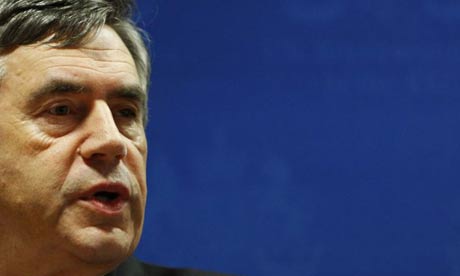Gordon Brown: 'One minute to midnight for Doha'
3.45pm BST
- guardian.co.uk,
- Wednesday June 25, 2008
- Article history

Photograph: Thierry Roge/Reuters
Gordon Brown warned today that almost seven years of acrimonious trade talks had reached their critical point as ministers from up to 40 countries were summoned to Geneva for a make-or-break meeting next month to break the deadlock.
After lobbying other world leaders over the past few weeks to conclude a round of liberalisation in agriculture, services and manufactured goods begun in Doha in November 2001, the prime minister said: "I believe that this is the end game for the trade talks and that there is a real chance of concluding them.
"We are within touching distance and a deal is there to be done, but this is one minute to midnight for Doha."
Brown's comments came after Pascal Lamy, director-general of the World Trade Organisation set an end of July deadline for a breakthrough in the two toughest areas under negotiation - agriculture and industrial goods. Talks will begin on July 21 and are expected to last a week.
WTO sources said that Lamy was making a calculated gamble in calling ministers together. "The director-general believes the chances of success next month are greater than 50-50, but he is also warning that if the talks do not succeed there is a better than 50-50 chance of the Doha Round ending without an agreement", one source said.
Lamy is keen to broker a deal under which the European Union, the United States and China would get easier access for their manufactured goods to the big developing country markets - particularly Brazil and India - with the developing countries able to sell a wider range of farm products in Europe and North America in return.
Brown said that the next month would see a flurry of diplomatic activity aimed at resolving the remaining disputes between the WTO's 152 members, and that he would push hard for a deal at next month's G8 summit in Japan.
WTO sources said that one potential problem was that countries will have the right to exempt certain "sensitive" or "special" products from any agreement, but that these lists would not be finalised until after an outline deal was agreed. In the past, the United States has been wary of signing up to an agreement on this basis.
Brown said there was a risk of a new era of protectionism that would harm developing countries. "Opening up Western agricultural markets would be worth $15bn (£7.5bn) a year to the poorest countries. Failure would be an own goal that would hit the poorest hardest and it would be a crippling blow to the future of the WTO itself. We can't afford to mess this up."
The prime minister said that failure to secure a deal over the next few months would make it hard to revive the negotiations. WTO sources believe it could take years to re-start talks in the event of a breakdown in negotiations next month, but that a deal on agriculture and industrial goods next month would make a final agreement possible in 2009.
Without a breakthrough before the summer break in August, the round is likely to be put on hold as the United States heads into its presidential election campaign and the subsequent replacement of its administration.
"I think it is perfectly imaginable that this deal can be done, but a lot of hard work needs to be done first," said the European Union's top civil servant for trade, David O'Sullivan.
"I agree with him," added US ambassador to the WTO, Peter Allgeier, who also participated in Lamy's briefing.
India's WTO ambassador, Ujal Singh Bhatia was noncommittal on whether the July meeting of ministers could overcome the resistance many countries have shown to accepting a Doha deal.
"I will tell you on the 20th," he said when asked about the chances of a successful meeting.
The Doha round was launched in 2001, shortly after the 9/11 attacks on the US, in the hope of giving the global economy a boost and helping poor countries export more.
But the negotiations have missed deadline after deadline as countries, rich and poor, have clashed on core issues such as cutting farm subsidies and import tariffs and opening up their markets for goods such as cars or textiles to more competition.

No comments:
Post a Comment